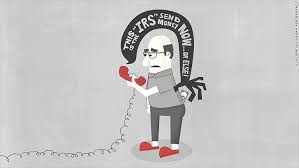April 15 is just around the corner, and millions of U.S. consumers and business owners are furiously working on their returns and brainstorming how to minimize tax liabilities. Frustratingly, thousands of scammers think of “tax season” as a kind of “hunting season” – a time to target vulnerable, anxious and unsuspecting consumers hoping for refunds.
According to an alarming article in Time magazine, since 2013, the government has lost $21 billion to these crooks, while scammers have robbed taxpayers of $26.5 million. Per the IRS, scams have soared 400% in 2016. IRS Commissioner John Koskinen warned: “These schemes continue to adapt and evolve in an attempt to catch people off guard just as they are preparing their tax returns.”
So how can you avoid being taken in by these illegal acts? Here are five battle-tested strategies.
Tip 1: Do Not Provide Personal Information to Any “IRS Agent” Who Randomly Calls You.
The scam goes as follows: The crook contacts you and asks for additional information, like your bank account number or Social Security number. Don’t fall for this trick! The IRS would never call you without reason and ask for this information over the phone. If you fear you might owe extra taxes, call the IRS directly at 800-829-1040 for further information.
Tip 2: Watch Out for “Phishing” Expeditions via Email or Texts
You might receive an official-looking email or text from the IRS requesting tax-related information from you. When you click on the link, it directs you to a site that wants personal financial information. In addition to fraudulently filing tax returns, these sites sometimes use malware to infect computers. To combat these kinds of scams, the IRS has set up a hotline where you can report suspect emails through phishing@irs.gov.
Tip 3: Beware of Event-Related Scams.
Scammers attempt to prey on unsuspecting, scared consumers by citing a recent natural disaster, such as a flood, typhoon or earthquake – some humanitarian crisis that galvanizes people to give to charity. In a disgusting turn, they pretend to seek support for victims but instead rob taxpayers.
Tip 4: Don’t Succumb to Intimidation.
The IRS allows you to file an appeal, and the agency will not threaten to send the police to your home for alleged failure to pay a supposed debt. Don’t let an “IRS agent” intimidate you.
Tip 5: Steer Clear of the “Choose a Payment” Ploy.
Scammers sometimes demand that you pay them via an immediate method, such as a wire transfer or pre-loaded credit card. If you ask for time to pay or try to set up other payment arrangements, they become hostile and make all types of threats. However, the IRS works with clients, setting up payment plans in many cases.
Help for Consumers when Dealing with the IRS
Our clients sometimes feel stressed due to unresolved IRS bills. For help dealing with old bills or questions about payment plans, contact us at 720-398-6088.

